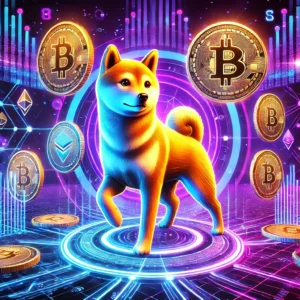
Play-to-Earn Crypto Games: Revolutionizing Gaming with Blockchain Technology
The gaming industry is undergoing a remarkable transformation, thanks to the rise of blockchain technology and cryptocurrencies. Play-to-Earn (P2E) crypto games are at the forefront of this revolution, enabling players to earn real-world value for their time and skills. These games blend gaming with decentralized finance (DeFi), creating new opportunities for gamers, developers, and investors alike.
This blog explores the world of P2E crypto games, their mechanics, advantages, challenges, and the potential they hold for reshaping the gaming industry.
What Are Play-to-Earn Crypto Games?
Play-to-Earn crypto games are blockchain-based games that allow players to earn cryptocurrency or other blockchain-based assets as rewards for their participation. Unlike traditional games where in-game rewards have no tangible value outside the game, P2E games enable players to monetize their achievements, creating a dynamic ecosystem where gaming meets real-world economics.
The earned assets, such as non-fungible tokens (NFTs) or cryptocurrencies, can often be traded on secondary markets, converted to fiat currency, or used in other decentralized applications.
How Do P2E Crypto Games Work?
P2E crypto games are built on blockchain technology, which ensures transparency, security, and decentralization. Here’s how they generally operate:
- Ownership of Digital Assets: Players earn NFTs or tokens that represent in-game items, characters, or resources. These assets are stored on a blockchain, giving players true ownership.
- In-Game Rewards: By completing tasks, winning battles, or participating in events, players earn cryptocurrency or NFTs. For example, in Axie Infinity, players breed, raise, and battle creatures called Axies to earn Smooth Love Potion (SLP) tokens.
- Marketplace Trading: Players can buy, sell, or trade their in-game assets on blockchain marketplaces, such as OpenSea, Rarible, or the game’s native marketplace.
- Integration with DeFi: Some P2E games allow players to stake their tokens or use them in yield farming, adding an extra layer of earning potential.
Popular Play-to-Earn Crypto Games
Several P2E games have gained immense popularity, attracting millions of players worldwide. Here are some notable examples:
- Axie Infinity: Often considered the pioneer of P2E gaming, Axie Infinity lets players earn by breeding, trading, and battling Axies. It uses Ethereum-based tokens, such as SLP and AXS.
- The Sandbox: A virtual metaverse where players can create, own, and monetize experiences using LAND NFTs and the SAND token.
- Gods Unchained: A trading card game where players earn rewards through strategic gameplay and can trade their cards as NFTs.
- Decentraland: A decentralized virtual world where players can buy land, create experiences, and earn through their contributions to the metaverse.
- Splinterlands: A collectible card game offering players rewards in the form of Splintershards (SPS) tokens and tradeable NFTs.
Advantages of Play-to-Earn Crypto Games
- Economic Opportunities: P2E games create a new income stream for players, particularly in developing countries where the value of earned cryptocurrency can be significant.
- True Asset Ownership: Players retain control over their in-game items, which can be traded or sold freely.
- Community-Driven Ecosystems: Blockchain technology enables decentralized governance, where players and developers collectively decide the future of the game.
- Innovation in Gaming: The integration of DeFi and NFTs into gaming paves the way for unique gameplay experiences and monetization strategies.
Challenges and Risks
While P2E games offer exciting opportunities, they also come with challenges:
- Volatility: The value of in-game assets and tokens can be highly volatile, impacting earnings.
- Regulatory Uncertainty: The legal landscape for crypto gaming is still evolving, with potential risks related to taxation and securities regulation.
- High Entry Costs: Some P2E games require significant upfront investment, such as purchasing NFTs, which can deter new players.
- Security Risks: As with any blockchain application, P2E games are vulnerable to hacking and scams.
- Sustainability Concerns: The success of P2E games depends on maintaining an active player base and a thriving in-game economy.
The Future of Play-to-Earn Crypto Games
The P2E gaming model is still in its infancy, but its potential is enormous. Innovations like Layer 2 solutions and cross-chain interoperability are likely to reduce transaction fees and improve scalability, making P2E games more accessible. Additionally, the integration of artificial intelligence (AI) and virtual reality (VR) could enhance the immersive experience, attracting a broader audience.
As blockchain technology matures and mainstream adoption increases, P2E games could redefine the relationship between gaming and finance, creating a new paradigm where players not only play for fun but also for financial empowerment.
Conclusion
Play-to-Earn crypto games represent a significant evolution in the gaming industry, combining entertainment with economic incentives. While there are challenges to overcome, the potential benefits for players, developers, and investors make this an exciting space to watch. As the industry evolves, P2E games could become a cornerstone of the digital economy, blurring the lines between virtual worlds and real-world value.
Are you ready to dive into the future of gaming? Join the P2E revolution and start earning while you play!





